IFN663 Advanced Enterprise Architecture: Modelling Social Services
VerifiedAdded on 2023/06/07
|9
|1415
|274
Report
AI Summary
This report provides an in-depth analysis of enterprise architecture (EA) within the context of an Australian federal government agency responsible for delivering social support services. It begins by outlining multi-level business capabilities, specifically focusing on service delivery management and customer management, and illustrates these with value stream maps. The report then transitions into the representation of the enterprise architecture using the Archimate modeling language, providing a visual and structured overview of the system. Key aspects of the claim process, from initiation to completion, are discussed, highlighting the importance of each step. The report concludes by emphasizing the crucial role of EA in helping organizations achieve their current and future goals, making it a highly recommended approach for enterprises.

Running head: ADVANCED ENTERPRISE ARCHITECTURE
Advanced Enterprise Architecture
[Name of the Student]
[Name of the University]
[Author note]
Advanced Enterprise Architecture
[Name of the Student]
[Name of the University]
[Author note]
Paraphrase This Document
Need a fresh take? Get an instant paraphrase of this document with our AI Paraphraser
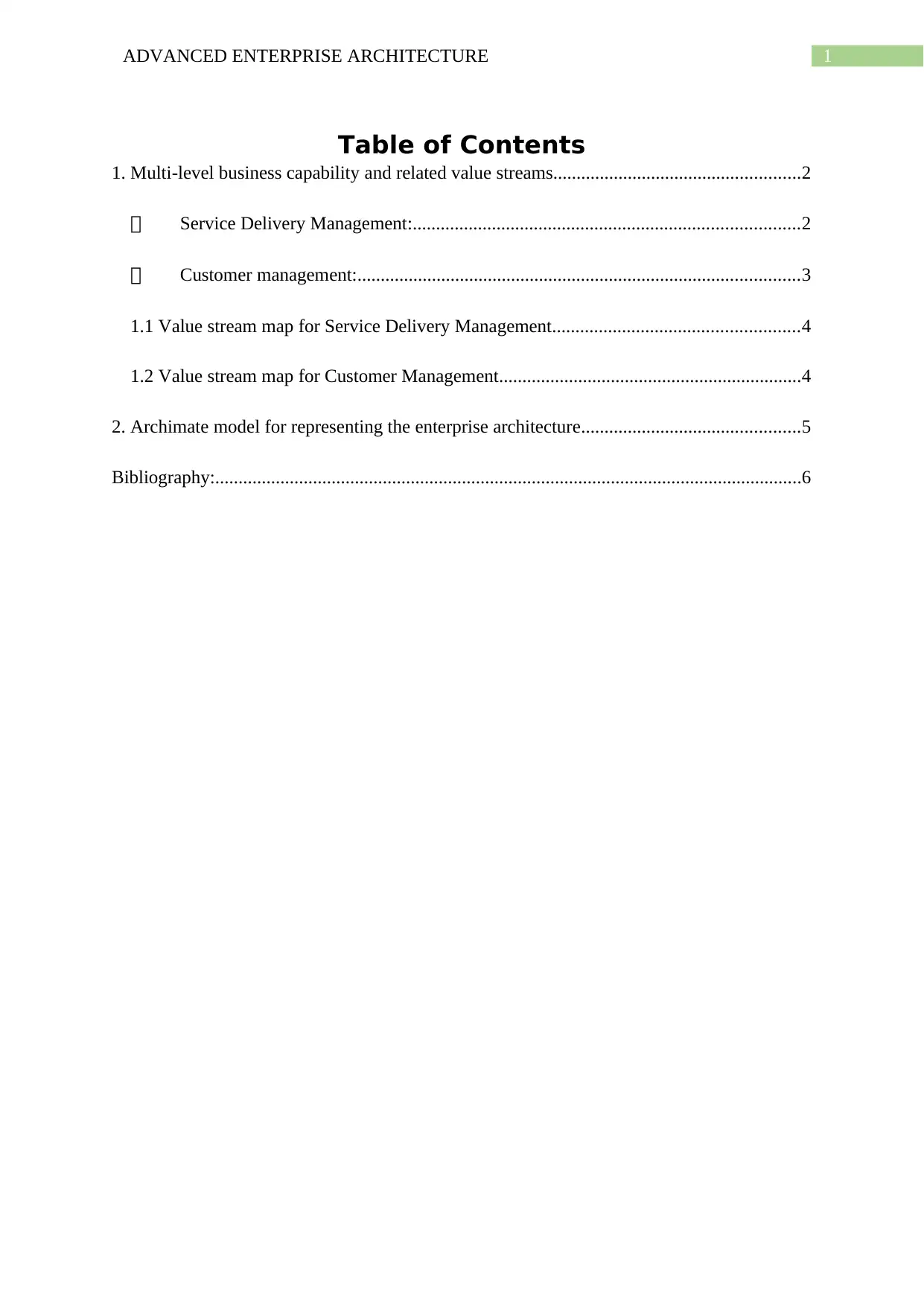
1ADVANCED ENTERPRISE ARCHITECTURE
Table of Contents
1. Multi-level business capability and related value streams.....................................................2
Service Delivery Management:...................................................................................2
Customer management:...............................................................................................3
1.1 Value stream map for Service Delivery Management.....................................................4
1.2 Value stream map for Customer Management.................................................................4
2. Archimate model for representing the enterprise architecture...............................................5
Bibliography:..............................................................................................................................6
Table of Contents
1. Multi-level business capability and related value streams.....................................................2
Service Delivery Management:...................................................................................2
Customer management:...............................................................................................3
1.1 Value stream map for Service Delivery Management.....................................................4
1.2 Value stream map for Customer Management.................................................................4
2. Archimate model for representing the enterprise architecture...............................................5
Bibliography:..............................................................................................................................6
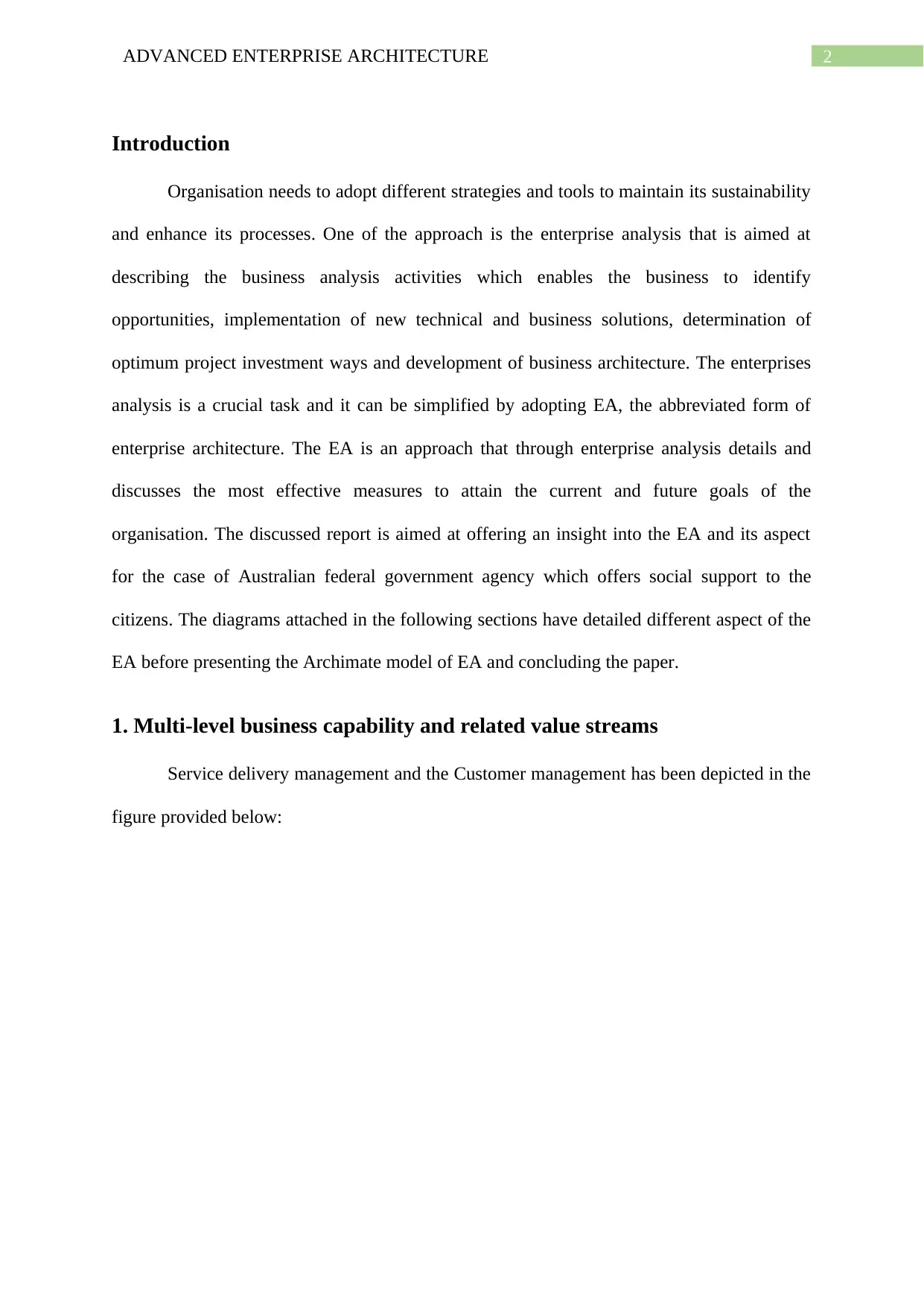
2ADVANCED ENTERPRISE ARCHITECTURE
Introduction
Organisation needs to adopt different strategies and tools to maintain its sustainability
and enhance its processes. One of the approach is the enterprise analysis that is aimed at
describing the business analysis activities which enables the business to identify
opportunities, implementation of new technical and business solutions, determination of
optimum project investment ways and development of business architecture. The enterprises
analysis is a crucial task and it can be simplified by adopting EA, the abbreviated form of
enterprise architecture. The EA is an approach that through enterprise analysis details and
discusses the most effective measures to attain the current and future goals of the
organisation. The discussed report is aimed at offering an insight into the EA and its aspect
for the case of Australian federal government agency which offers social support to the
citizens. The diagrams attached in the following sections have detailed different aspect of the
EA before presenting the Archimate model of EA and concluding the paper.
1. Multi-level business capability and related value streams
Service delivery management and the Customer management has been depicted in the
figure provided below:
Introduction
Organisation needs to adopt different strategies and tools to maintain its sustainability
and enhance its processes. One of the approach is the enterprise analysis that is aimed at
describing the business analysis activities which enables the business to identify
opportunities, implementation of new technical and business solutions, determination of
optimum project investment ways and development of business architecture. The enterprises
analysis is a crucial task and it can be simplified by adopting EA, the abbreviated form of
enterprise architecture. The EA is an approach that through enterprise analysis details and
discusses the most effective measures to attain the current and future goals of the
organisation. The discussed report is aimed at offering an insight into the EA and its aspect
for the case of Australian federal government agency which offers social support to the
citizens. The diagrams attached in the following sections have detailed different aspect of the
EA before presenting the Archimate model of EA and concluding the paper.
1. Multi-level business capability and related value streams
Service delivery management and the Customer management has been depicted in the
figure provided below:
⊘ This is a preview!⊘
Do you want full access?
Subscribe today to unlock all pages.

Trusted by 1+ million students worldwide
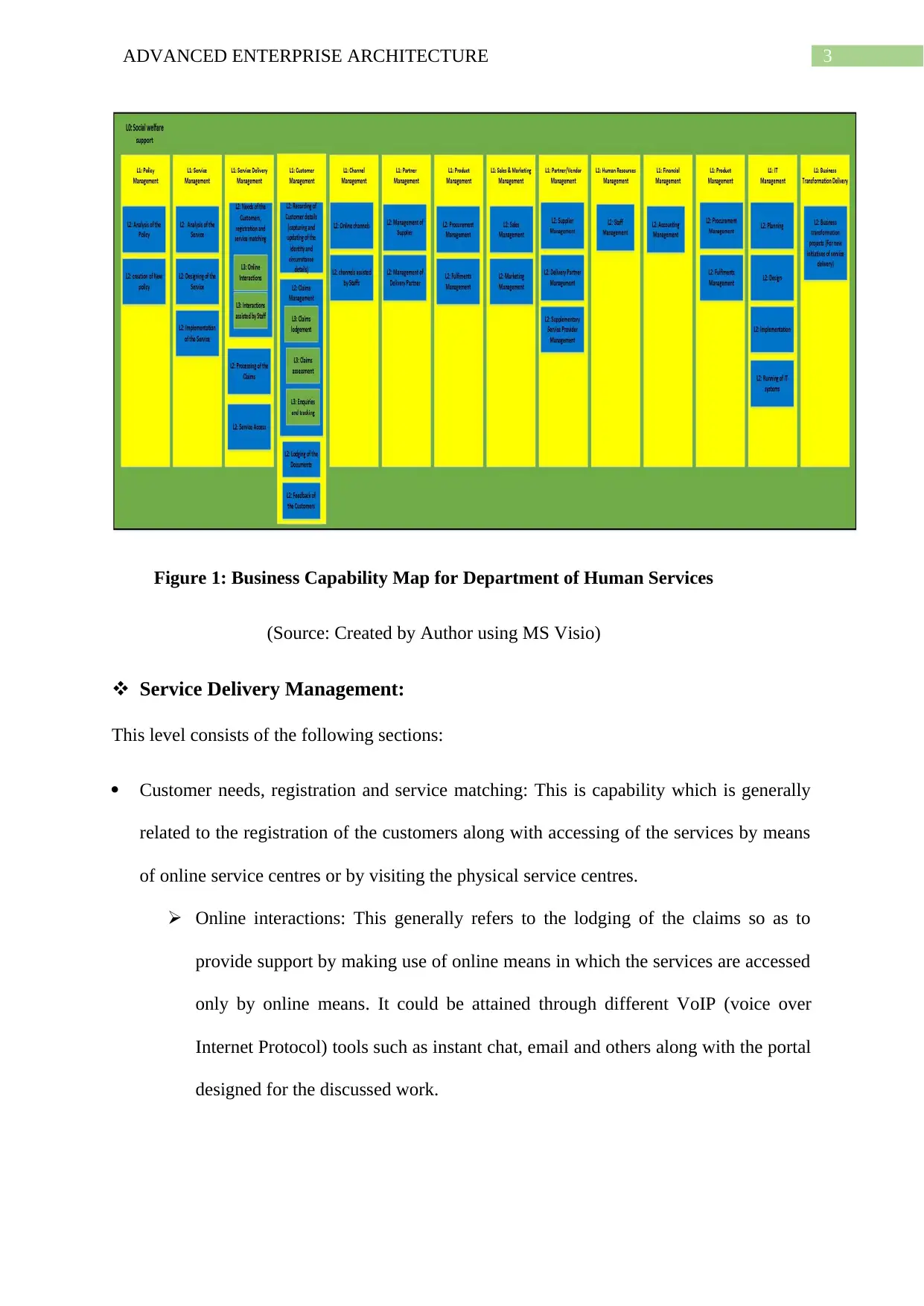
3ADVANCED ENTERPRISE ARCHITECTURE
Figure 1: Business Capability Map for Department of Human Services
(Source: Created by Author using MS Visio)
Service Delivery Management:
This level consists of the following sections:
Customer needs, registration and service matching: This is capability which is generally
related to the registration of the customers along with accessing of the services by means
of online service centres or by visiting the physical service centres.
Online interactions: This generally refers to the lodging of the claims so as to
provide support by making use of online means in which the services are accessed
only by online means. It could be attained through different VoIP (voice over
Internet Protocol) tools such as instant chat, email and others along with the portal
designed for the discussed work.
Figure 1: Business Capability Map for Department of Human Services
(Source: Created by Author using MS Visio)
Service Delivery Management:
This level consists of the following sections:
Customer needs, registration and service matching: This is capability which is generally
related to the registration of the customers along with accessing of the services by means
of online service centres or by visiting the physical service centres.
Online interactions: This generally refers to the lodging of the claims so as to
provide support by making use of online means in which the services are accessed
only by online means. It could be attained through different VoIP (voice over
Internet Protocol) tools such as instant chat, email and others along with the portal
designed for the discussed work.
Paraphrase This Document
Need a fresh take? Get an instant paraphrase of this document with our AI Paraphraser
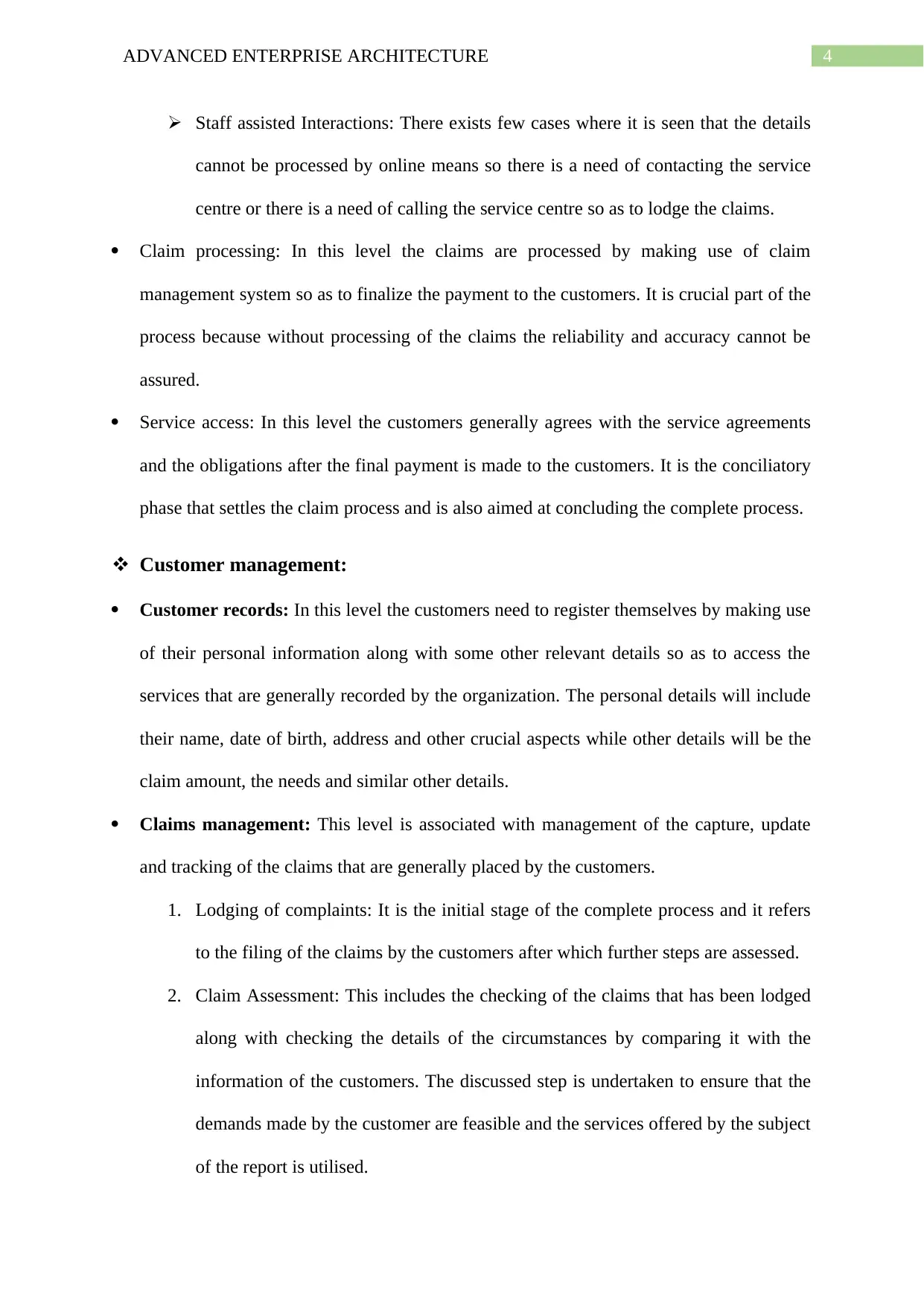
4ADVANCED ENTERPRISE ARCHITECTURE
Staff assisted Interactions: There exists few cases where it is seen that the details
cannot be processed by online means so there is a need of contacting the service
centre or there is a need of calling the service centre so as to lodge the claims.
Claim processing: In this level the claims are processed by making use of claim
management system so as to finalize the payment to the customers. It is crucial part of the
process because without processing of the claims the reliability and accuracy cannot be
assured.
Service access: In this level the customers generally agrees with the service agreements
and the obligations after the final payment is made to the customers. It is the conciliatory
phase that settles the claim process and is also aimed at concluding the complete process.
Customer management:
Customer records: In this level the customers need to register themselves by making use
of their personal information along with some other relevant details so as to access the
services that are generally recorded by the organization. The personal details will include
their name, date of birth, address and other crucial aspects while other details will be the
claim amount, the needs and similar other details.
Claims management: This level is associated with management of the capture, update
and tracking of the claims that are generally placed by the customers.
1. Lodging of complaints: It is the initial stage of the complete process and it refers
to the filing of the claims by the customers after which further steps are assessed.
2. Claim Assessment: This includes the checking of the claims that has been lodged
along with checking the details of the circumstances by comparing it with the
information of the customers. The discussed step is undertaken to ensure that the
demands made by the customer are feasible and the services offered by the subject
of the report is utilised.
Staff assisted Interactions: There exists few cases where it is seen that the details
cannot be processed by online means so there is a need of contacting the service
centre or there is a need of calling the service centre so as to lodge the claims.
Claim processing: In this level the claims are processed by making use of claim
management system so as to finalize the payment to the customers. It is crucial part of the
process because without processing of the claims the reliability and accuracy cannot be
assured.
Service access: In this level the customers generally agrees with the service agreements
and the obligations after the final payment is made to the customers. It is the conciliatory
phase that settles the claim process and is also aimed at concluding the complete process.
Customer management:
Customer records: In this level the customers need to register themselves by making use
of their personal information along with some other relevant details so as to access the
services that are generally recorded by the organization. The personal details will include
their name, date of birth, address and other crucial aspects while other details will be the
claim amount, the needs and similar other details.
Claims management: This level is associated with management of the capture, update
and tracking of the claims that are generally placed by the customers.
1. Lodging of complaints: It is the initial stage of the complete process and it refers
to the filing of the claims by the customers after which further steps are assessed.
2. Claim Assessment: This includes the checking of the claims that has been lodged
along with checking the details of the circumstances by comparing it with the
information of the customers. The discussed step is undertaken to ensure that the
demands made by the customer are feasible and the services offered by the subject
of the report is utilised.
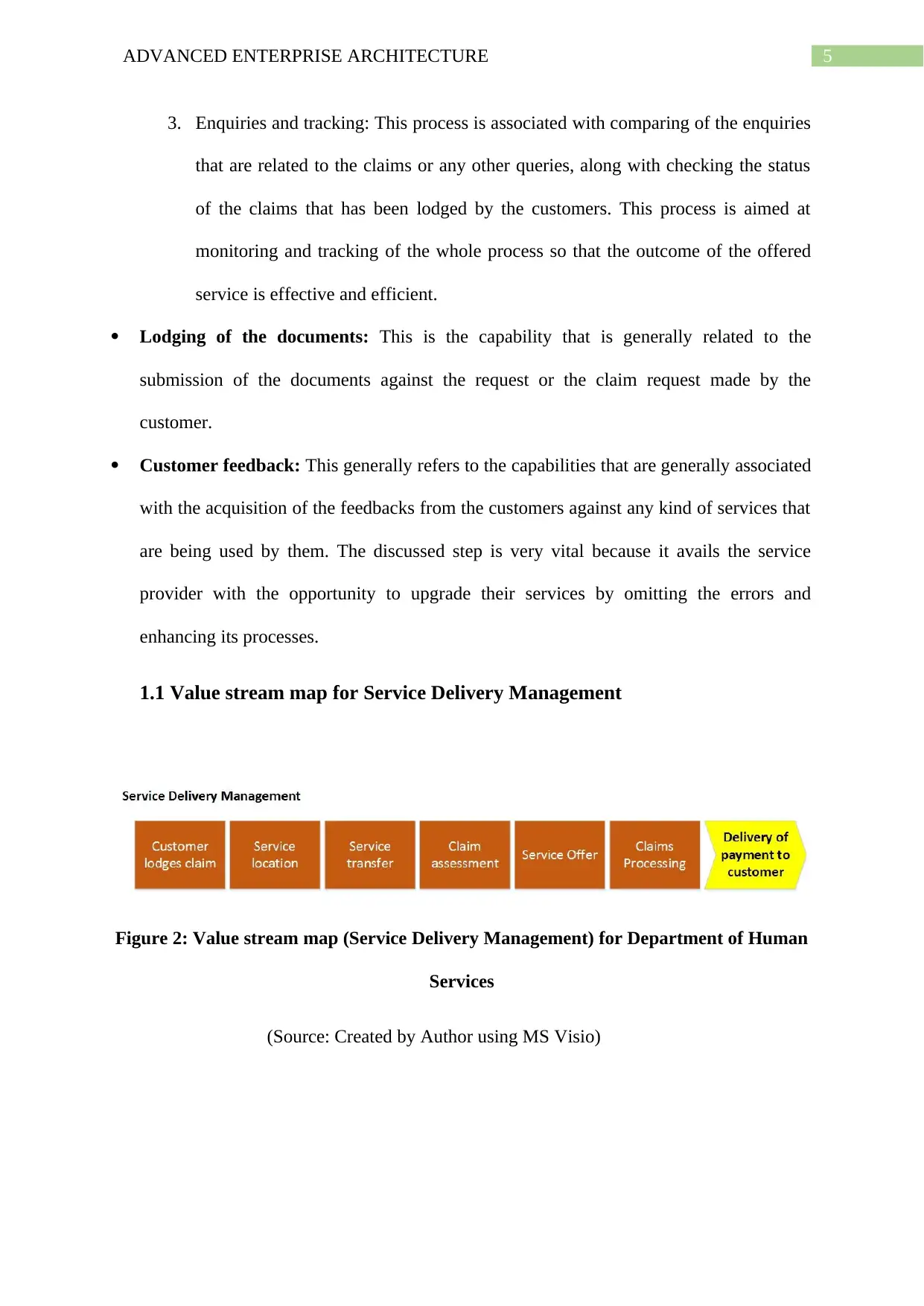
5ADVANCED ENTERPRISE ARCHITECTURE
3. Enquiries and tracking: This process is associated with comparing of the enquiries
that are related to the claims or any other queries, along with checking the status
of the claims that has been lodged by the customers. This process is aimed at
monitoring and tracking of the whole process so that the outcome of the offered
service is effective and efficient.
Lodging of the documents: This is the capability that is generally related to the
submission of the documents against the request or the claim request made by the
customer.
Customer feedback: This generally refers to the capabilities that are generally associated
with the acquisition of the feedbacks from the customers against any kind of services that
are being used by them. The discussed step is very vital because it avails the service
provider with the opportunity to upgrade their services by omitting the errors and
enhancing its processes.
1.1 Value stream map for Service Delivery Management
Figure 2: Value stream map (Service Delivery Management) for Department of Human
Services
(Source: Created by Author using MS Visio)
3. Enquiries and tracking: This process is associated with comparing of the enquiries
that are related to the claims or any other queries, along with checking the status
of the claims that has been lodged by the customers. This process is aimed at
monitoring and tracking of the whole process so that the outcome of the offered
service is effective and efficient.
Lodging of the documents: This is the capability that is generally related to the
submission of the documents against the request or the claim request made by the
customer.
Customer feedback: This generally refers to the capabilities that are generally associated
with the acquisition of the feedbacks from the customers against any kind of services that
are being used by them. The discussed step is very vital because it avails the service
provider with the opportunity to upgrade their services by omitting the errors and
enhancing its processes.
1.1 Value stream map for Service Delivery Management
Figure 2: Value stream map (Service Delivery Management) for Department of Human
Services
(Source: Created by Author using MS Visio)
⊘ This is a preview!⊘
Do you want full access?
Subscribe today to unlock all pages.

Trusted by 1+ million students worldwide
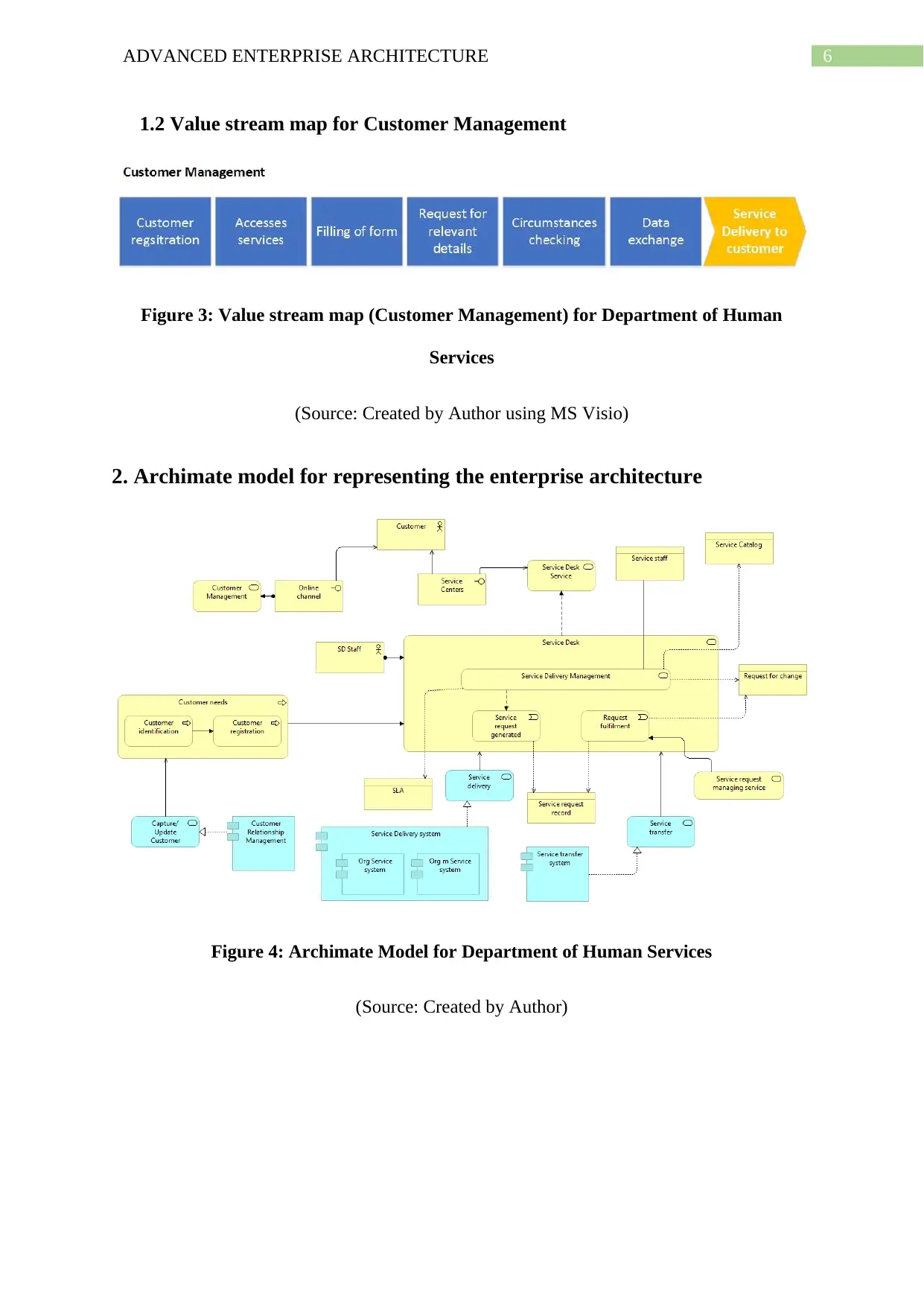
6ADVANCED ENTERPRISE ARCHITECTURE
1.2 Value stream map for Customer Management
Figure 3: Value stream map (Customer Management) for Department of Human
Services
(Source: Created by Author using MS Visio)
2. Archimate model for representing the enterprise architecture
Figure 4: Archimate Model for Department of Human Services
(Source: Created by Author)
1.2 Value stream map for Customer Management
Figure 3: Value stream map (Customer Management) for Department of Human
Services
(Source: Created by Author using MS Visio)
2. Archimate model for representing the enterprise architecture
Figure 4: Archimate Model for Department of Human Services
(Source: Created by Author)
Paraphrase This Document
Need a fresh take? Get an instant paraphrase of this document with our AI Paraphraser
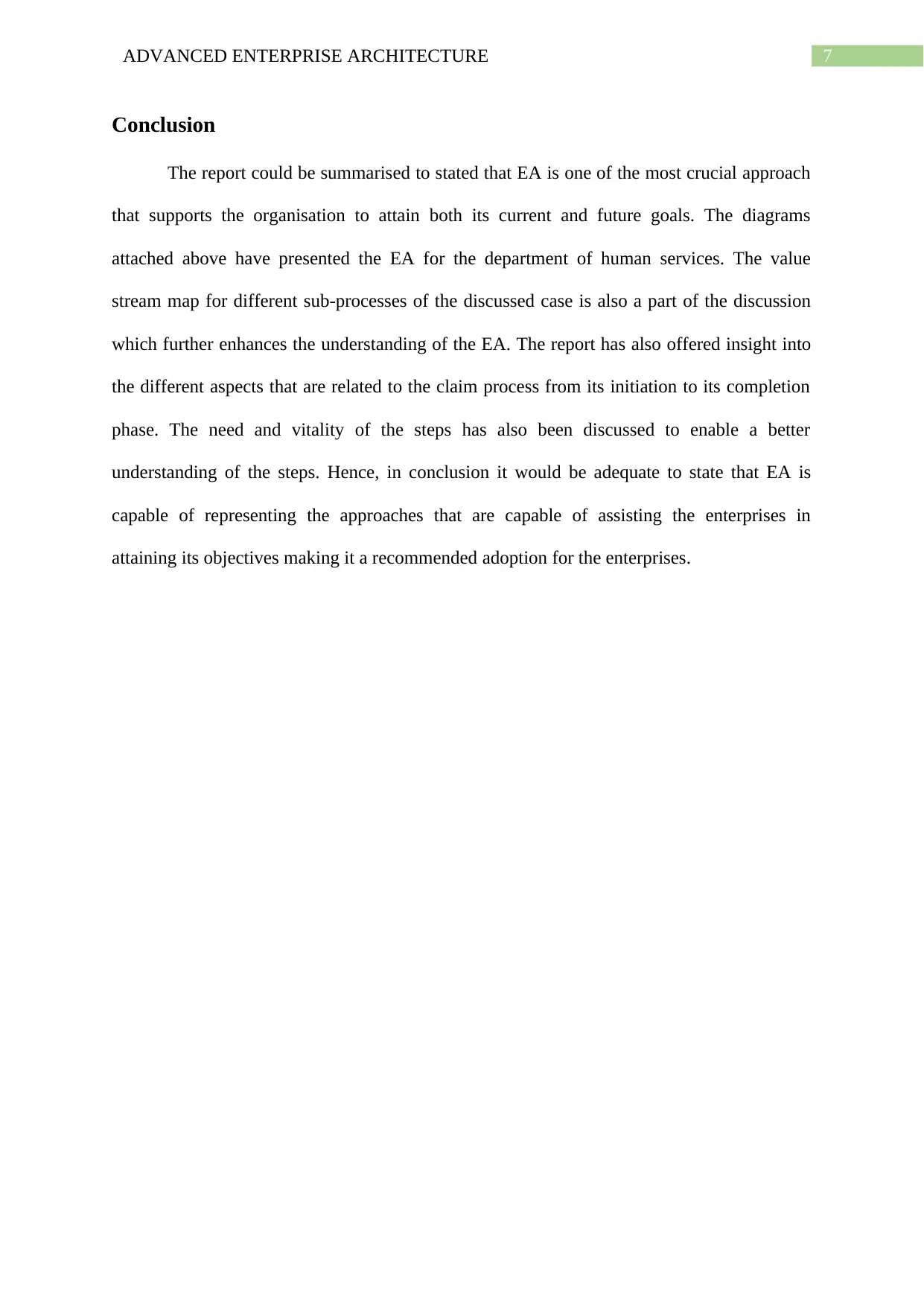
7ADVANCED ENTERPRISE ARCHITECTURE
Conclusion
The report could be summarised to stated that EA is one of the most crucial approach
that supports the organisation to attain both its current and future goals. The diagrams
attached above have presented the EA for the department of human services. The value
stream map for different sub-processes of the discussed case is also a part of the discussion
which further enhances the understanding of the EA. The report has also offered insight into
the different aspects that are related to the claim process from its initiation to its completion
phase. The need and vitality of the steps has also been discussed to enable a better
understanding of the steps. Hence, in conclusion it would be adequate to state that EA is
capable of representing the approaches that are capable of assisting the enterprises in
attaining its objectives making it a recommended adoption for the enterprises.
Conclusion
The report could be summarised to stated that EA is one of the most crucial approach
that supports the organisation to attain both its current and future goals. The diagrams
attached above have presented the EA for the department of human services. The value
stream map for different sub-processes of the discussed case is also a part of the discussion
which further enhances the understanding of the EA. The report has also offered insight into
the different aspects that are related to the claim process from its initiation to its completion
phase. The need and vitality of the steps has also been discussed to enable a better
understanding of the steps. Hence, in conclusion it would be adequate to state that EA is
capable of representing the approaches that are capable of assisting the enterprises in
attaining its objectives making it a recommended adoption for the enterprises.
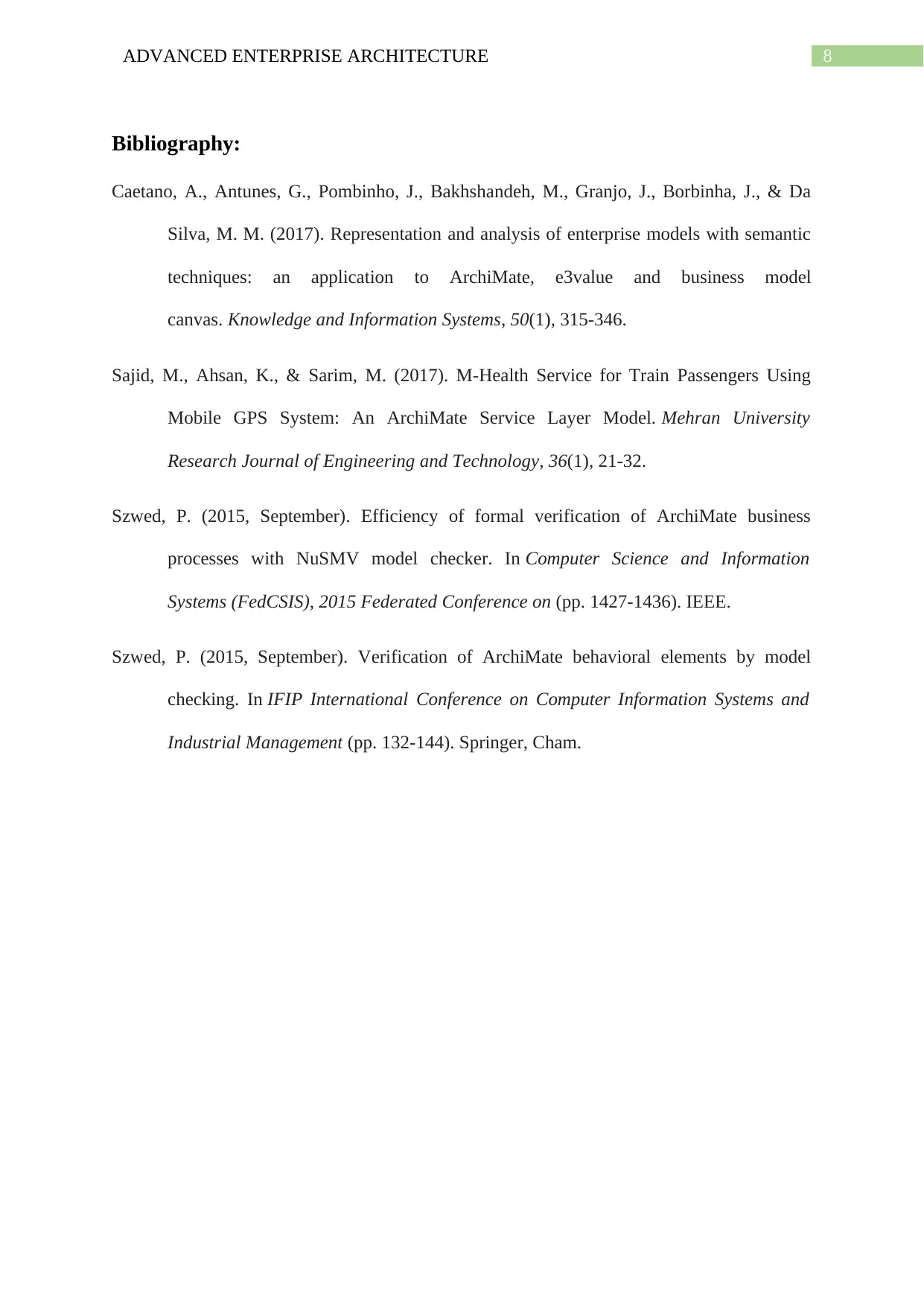
8ADVANCED ENTERPRISE ARCHITECTURE
Bibliography:
Caetano, A., Antunes, G., Pombinho, J., Bakhshandeh, M., Granjo, J., Borbinha, J., & Da
Silva, M. M. (2017). Representation and analysis of enterprise models with semantic
techniques: an application to ArchiMate, e3value and business model
canvas. Knowledge and Information Systems, 50(1), 315-346.
Sajid, M., Ahsan, K., & Sarim, M. (2017). M-Health Service for Train Passengers Using
Mobile GPS System: An ArchiMate Service Layer Model. Mehran University
Research Journal of Engineering and Technology, 36(1), 21-32.
Szwed, P. (2015, September). Efficiency of formal verification of ArchiMate business
processes with NuSMV model checker. In Computer Science and Information
Systems (FedCSIS), 2015 Federated Conference on (pp. 1427-1436). IEEE.
Szwed, P. (2015, September). Verification of ArchiMate behavioral elements by model
checking. In IFIP International Conference on Computer Information Systems and
Industrial Management (pp. 132-144). Springer, Cham.
Bibliography:
Caetano, A., Antunes, G., Pombinho, J., Bakhshandeh, M., Granjo, J., Borbinha, J., & Da
Silva, M. M. (2017). Representation and analysis of enterprise models with semantic
techniques: an application to ArchiMate, e3value and business model
canvas. Knowledge and Information Systems, 50(1), 315-346.
Sajid, M., Ahsan, K., & Sarim, M. (2017). M-Health Service for Train Passengers Using
Mobile GPS System: An ArchiMate Service Layer Model. Mehran University
Research Journal of Engineering and Technology, 36(1), 21-32.
Szwed, P. (2015, September). Efficiency of formal verification of ArchiMate business
processes with NuSMV model checker. In Computer Science and Information
Systems (FedCSIS), 2015 Federated Conference on (pp. 1427-1436). IEEE.
Szwed, P. (2015, September). Verification of ArchiMate behavioral elements by model
checking. In IFIP International Conference on Computer Information Systems and
Industrial Management (pp. 132-144). Springer, Cham.
⊘ This is a preview!⊘
Do you want full access?
Subscribe today to unlock all pages.

Trusted by 1+ million students worldwide
1 out of 9
Related Documents
Your All-in-One AI-Powered Toolkit for Academic Success.
+13062052269
info@desklib.com
Available 24*7 on WhatsApp / Email
![[object Object]](/_next/static/media/star-bottom.7253800d.svg)
Unlock your academic potential
Copyright © 2020–2026 A2Z Services. All Rights Reserved. Developed and managed by ZUCOL.





